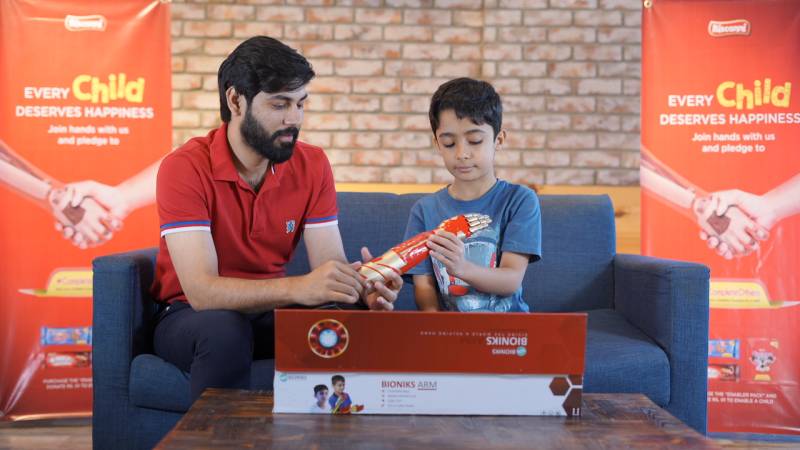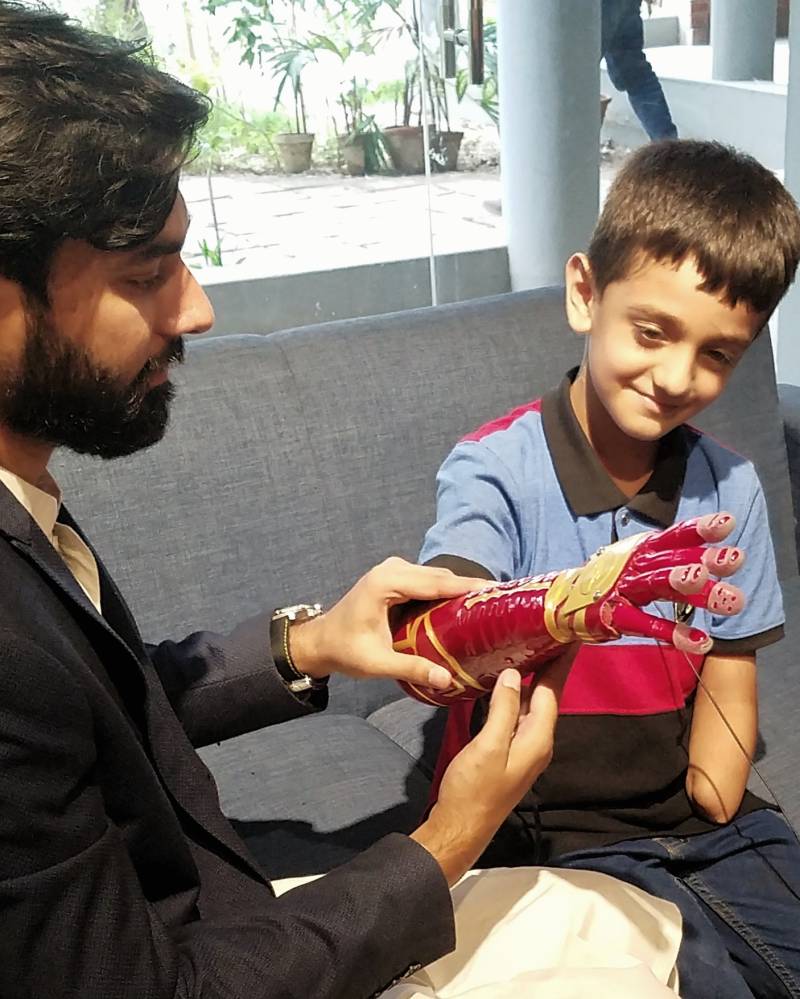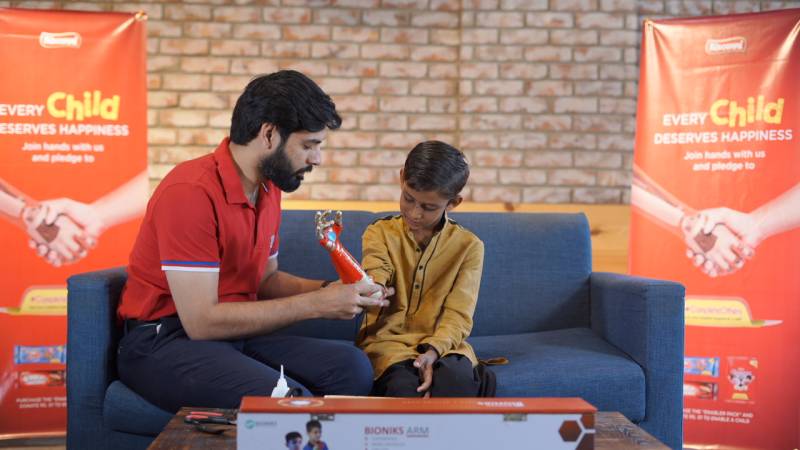Spearheaded in 2016, Karachi-based social enterprise, Bioniks, specialises in brain-controlled, AI-powered bionic prostheses to enable a life of dignity and self-reliance. By providing custom-made, low-cost bionic arms, the Bioniks team has made a heartfelt impact in Pakistan by standing as the only prosthetic manufacturer in the country.
Mindfully made with cutting-edge sensors and software, the technology empowers individuals to grasp objects with robotic fingers, giving users functionality and ease in their daily activities.
Born and brought up in Nawabshah, Anas Niaz, the young Co-founder and Chief Visionary Officer of Bioniks, was always a high achiever in school – from the classroom, on the sports field and even as a pro debater at inter-school debating competitions.
With an undergraduate degree in mechatronics, robotics, and automation from SZABIST (Karachi), Anas was also the President of the SZABIST Lions Club Karachi and the ASME (American Society of Mechanical Engineers). Interestingly, before walking the path of entrepreneurship, Anas worked as a radio show host for three years, a long stint that he thoroughly enjoyed before donning the founder’s cap.
Recognised for his work and contributions in Pakistan through his social enterprise, Anas was included in Forbes’ prestigious 30 Under 30 list, just last year. What started out as a final semester project in college, to what Bioniks creates today, almost eight years later, The Friday Times sits down with Anas to speak with the young entrepreneur about his career, his very first client (a little boy who desperately required a prosthetic arm), the future of the prosthetics industry and Bioniks’ place in it and much more…
Q: Anas, what inspired you to start Bioniks? Can you tell us about your journey you’re your first start-up, Viscous.co, to creating brain-controlled, AI-powered bionic prostheses?
Before founding Bioniks, I began my career as a radio host, then transitioned to entrepreneurship, launching Viscous.co for product design and development during my studies. One pivotal moment came when a family asked us to design a prosthetic for their 5-year-old son, Mir Biyyan Baloch, who was born with a congenital limb difference. Our Iron Man-themed prosthetic gained attention, leading to more requests and revealing a significant market need.
This chance encounter with Mir's story and an email from his parents, desperately seeking a prosthetic solution for their son, changed everything. This inspired the creation of Bioniks in 2016, driving us to use technology to create bionic arms, with a clear vision to provide affordable, innovative solutions that restore hope and dignity. Bioniks specializes in advanced functional prostheses, and has since made a significant impact on the lives of many people with limb differences and disabilities.
Q: Bioniks has successfully empowered over 500 individuals with limb differences worldwide. Can you share a specific success story that stands out and highlights the transformative effect of your technology?
From the 500 individuals empowered by Bioniks, one conversation among three young users stands out for me. Picture three kids, aged 7 to 10, sharing the wonders of their bionic arms. Their innocent curiosity echoed in discussions about lifting weights, mastering the art of eating and drinking, and helping their parents. It transported me back to my own childhood, sneaking into the kitchen to watch my mom cook, eager to lend a hand. It dawned on me that these children, facing life with limb differences, were now effortlessly integrating into the fabric of daily life, just like any other kids.
Q: Being celebrated for your contributions, what challenges have you faced in the field of bio-robotics, and how did you overcome them?
In Pakistan, venturing into technology entails facing significant resistance, demanding immense passion and commitment. Challenges are magnified when even the most basic components are scarce or of subpar quality due to a limited industry and low market demand. The regulatory landscape, unfriendly to hardware startups, adds an extra layer of complexity. Despite these formidable odds, building a hardware startup is exceptionally challenging, especially compared to other parts of the world.
However, the fervour for social impact and a steadfast commitment to a cause can transform individuals into superhumans capable of overcoming seemingly insurmountable obstacles. Bioniks stands as evidence to this narrative, where not only have we successfully developed our local product, but we've also garnered international recognition to boot.
Q: In your perspective, how can the integration of brain-controlled technology in assistive devices revolutionise the quality of life for individuals with physical disabilities?
The integration of brain-controlled technology in assistive devices has the potential to revolutionise the quality of life for individuals with physical disabilities by providing seamless and intuitive control. This innovation enables users to perform complex tasks with greater precision and independence, fostering a sense of empowerment. The direct connection between the brain and the device reduces the learning curve, making it more accessible for a diverse user base. This technological advancement not only enhances functional capabilities but also contributes to breaking down societal barriers by promoting inclusivity and changing perceptions about the capabilities of individuals with disabilities
Q: Bioniks is focused on transforming disabilities into new possibilities. How do you foresee the evolution of your mission in the coming years, and what impact do you hope to make in the field of assistive technology?
Bioniks envisions a continual evolution of its mission to transform disabilities into new possibilities. In the coming years, the mission will expand to embrace cutting-edge advancements in assistive technology, ensuring that individuals with disabilities have access to the most innovative solutions. The impact sought is not only in improving functional aspects but also in fostering a societal shift towards inclusivity and breaking down stigmas associated with disabilities.
Q: Anas, what's your biggest dream?
My biggest goal is to make Bioniks a global bio-robotics social enterprise, providing assistance worldwide without financial or accessibility barriers.
Q: As a well-known name in bio-robotics and evolutionary technologies in Pakistan, how do you envision the future of assistive technology and its impact on the lives of individuals with disabilities?
In the future, advanced assistive technology, fuelled by AI, mechatronics, and neuroscience, will revolutionize the lives of individuals with disabilities. This innovation promises enhanced mobility, natural movements, and increased independence, fostering a more inclusive and empowered society. The goal is to create a world where cutting-edge technology enables everyone to overcome physical limitations and live fuller lives.
Q: Are there any current projects being spearheaded at Bioniks that you'd like to tell us about?
Bioniks is currently pioneering digital technologies to introduce a ground breaking concept - tele-rehabilitation. This initiative is destined to reach individuals worldwide, especially those residing in regions without access to premium rehabilitation clinics and advanced prosthetic devices. In essence, we are sculpting a future where the transformative power of rehabilitation transcends geographical boundaries, bringing hope, healing, and empowerment to every corner of the globe.




